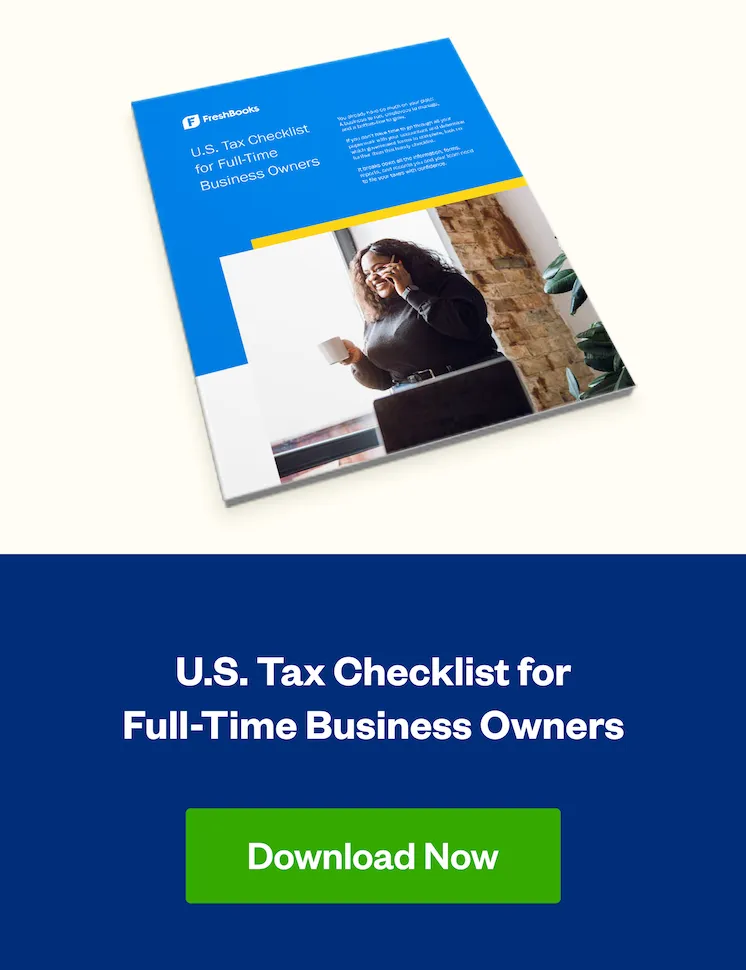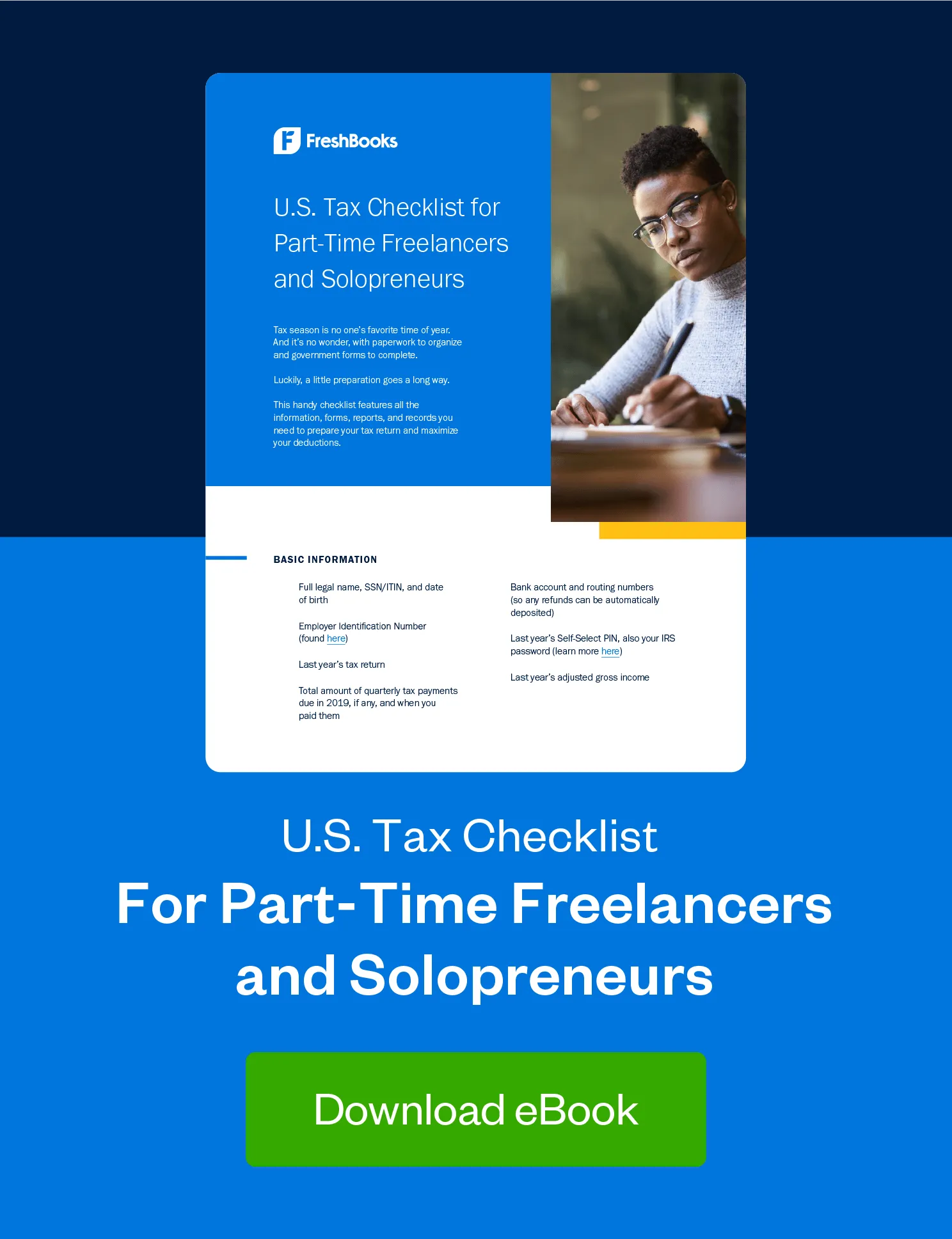Save time by getting the tax-time information you need the first time.

Managing your workload during tax season can be a challenge. There is a lot of back and forth with clients and they may not be quick to get you the documentation you need.
One thing that can make things run more smoothly: A thorough tax preparation checklist that will help clients think through what they need to bring in or send. By spelling out exactly what you need, they can start collecting everything and getting it to you well in advance of the tax deadline. And they won’t come to you with a lot of missing pieces, requiring more time and work on your part.
Don’t reinvent the wheel. Create an “accountant tax checklist” for your clients so they know what you need to get rolling on their taxes.
- Client Tax Prep Checklist: What to Bring to Your Accountant
- 1. Personal Information
- 2. Business Information
- 3. Personal Income Information
- 4. Personal Deductions
- 5. Business Financial Statements
- 6. Other Business Documents
- 7. Estimated Tax Payments
- Shareable Tax Checklist for Clients
- Personal Tax Information
- Business Information
- Personal Income Information
- Personal Deductions & Expenses
- Business Financial Statements
- Other Business Documents
Client Tax Prep Checklist: What to Bring to Your Accountant
Every client’s list of requirements is going to be a little bit different. Some may have rental income from a property or business and others might have employment income and need W-2 forms as well as their business income forms. Giving them a list of documents broken down into categories can help them think through what they need to bring to file their tax return.
The checklist covers seven categories:
- Personal
- Business
- Income
- Deductions
- Business financial statements
- Other business documents
- Estimated tax payments
Give them the checklist and tell them to think through any items that they need to find and bring in. You can also advise them if they’re not sure if you need something, to share it with you anyway. You can make the final decision about what is needed and what isn’t, and they’ll feel good knowing that they’ve left no stone unturned in finding the necessary documentation.
1. Personal Information
Getting the personal identification details right on a tax return is important. Every year the IRS rejects returns that don’t have matching data. In 2011, they sent 4.7 million notices to taxpayers because the information the IRS has on hand didn’t match the information on the filed tax return.
To help get this right, ask your clients to bring:
- Prior year’s individual income tax return
- Social Security numbers for every family member
- Birthdate for every family member
- Photo identification like driver’s licenses or military ID cards
- Bank account details
- Child care provider employer identification number (EIN, if applicable)
2. Business Information
Owning and operating a business adds even more complexity to annual taxes. Business owners need to submit additional info to get started. Be sure to include these items on your checklist for business owners:
- Prior year’s corporate tax return
- EIN, if applicable
- Partnership agreements, if applicable
- Change in ownership information, if applicable
- Bank account details
3. Personal Income Information
It’s important to help your clients understand that they need to be thorough when collecting income tax documents. Income documentation should cover all money that they received during the year.
You’ll want to have your client review the tax forms to make sure the amounts reported match their records. If there are any discrepancies, have them get those sorted out as early as possible.
Documents they should gather include:
- W-2 forms from any employers
- IRS 1099 forms, including:
- Form 1099-G (unemployment compensation)
- Form 1099-NEC (non-employee compensation)
- Form 1099-INT (interest income statements)
- Form 1099-DIV (dividend income statements)
- Form 1099-R (retirement income)
- IRS Schedule K-1 (Form 1065) for partnership income
- Income from rental properties
4. Personal Deductions
Remind your clients that deductions are where they can save big when it comes to their final bill. So it’s important for them to take the time to track down as many relevant expenses as possible. Expenses they should be looking for include:
- Receipts for medical expenses
- Primary residence documents including form 1098 (Mortgage Interest Statement), property tax records, and expenses related to energy-saving improvements
- Receipts for childcare expenses paid
- Charitable donation receipts
- Expenses related to any rental properties
5. Business Financial Statements
If your client owns their own business, you’ll want to remind them that they’ll need to provide you with financial statements. Ask them to provide:
- Profit and loss statement
- Balance sheet
If they use FreshBooks, remind them that these reports can be easily generated and shared with you. (They should invite you as an accountant.) Before they hand over the reports, ask them to verify that the data is correct and complete. And if they have any questions, encourage them to flag them for you rather than to guess.
6. Other Business Documents
Business financial statements aren’t going to be enough to complete your client’s business tax returns to file their business expenses and make sure that you help them find all the deductions possible. Ask your clients to bring in additional business documentation and data, including:
- Vehicle use log: If they use their car for business use, remind them to keep a log and ask them to provide you with an up-to-date mileage log that details their travel.
- Home office details: If your client runs their business from home, ask them to bring in their home office details, including the size of their home office, rental payments, and utility bills.
- Asset purchase receipts: If your client purchased any capital assets during the year, ask them to bring in the receipts.
7. Estimated Tax Payments
If your client made any estimated payments to the IRS during the year, ask them to bring the records and receipts for payments made. And if they didn’t make estimated payments, but they should have, you may want to have them set up due dates to make the four payments or work with you to calculate their estimated liability throughout the year.
As a tax preparer, getting your clients organized early on in the document retrieval process can be a big help in managing your workload during this busy time. This tax prep checklist can help you communicate to clients exactly what you need, improving your odds for a successful tax season.
Shareable Tax Checklist for Clients
Here is a handy tax checklist for clients in an easily shareable format, to get them ready to file their tax returns.
Personal Tax Information
- Last year’s individual income tax return (Form 1040)
- Social Security Numbers for every family member
- Birthdates for every family member
- Photo identification
- Bank account details (routing number, branch number, account number)
- Child care provider EIN (employer identification number), if applicable
Business Information
- Last year’s corporate tax return (Form 1120)
- Employee Identification Number (EIN), if applicable
- Partnership agreements, if applicable
- Change in ownership information, if applicable
- Business bank account details (routing number, branch number, account number)
Personal Income Information
- W-2 forms from any employers
- IRS 1099 forms, as applicable, including:
- Form 1099-G (unemployment compensation)
- Form 1099-NEC (non-employee compensation)
- Form 1099-INT (interest income statements)
- Form 1099-DIV (dividend income statements)
- Form 1099-R (retirement income)
- IRS Schedule K-1 (Form 1065) for partnership income
- Income from rental properties
Personal Deductions & Expenses
- Receipts for medical expenses
- Primary residence documents including form 1098 (Mortgage Interest Statement), property tax records, and expenses related to energy-saving improvements
- Receipts for childcare expenses paid
- Receipts for charitable donations
- Receipts for rental property expenses
Business Financial Statements
- Profit and loss statement
- Balance sheet
Other Business Documents
- Business vehicle-use mileage log
- Home office details (size, rental payments, utility bills)
- Capital asset purchase receipts
- Estimated Tax Payments
- IRS Estimated Tax payment receipts (Form 1040-ES)
about the author
Erica Gellerman is a CPA, MBA, content marketing writer, and founder of The Worth Project. Her work has been featured on Forbes, Money, Business Insider, The Everygirl, and more. She currently lives in Hawaii.

 How Tallyfor Integrates with FreshBooks for Easier U.S. Tax Returns
How Tallyfor Integrates with FreshBooks for Easier U.S. Tax Returns 7 Stress Management Strategies for Accountant
7 Stress Management Strategies for Accountant Accountants’ Top 3 FreshBooks Year-End Bank Reconciliation Questions, Answered
Accountants’ Top 3 FreshBooks Year-End Bank Reconciliation Questions, Answered







